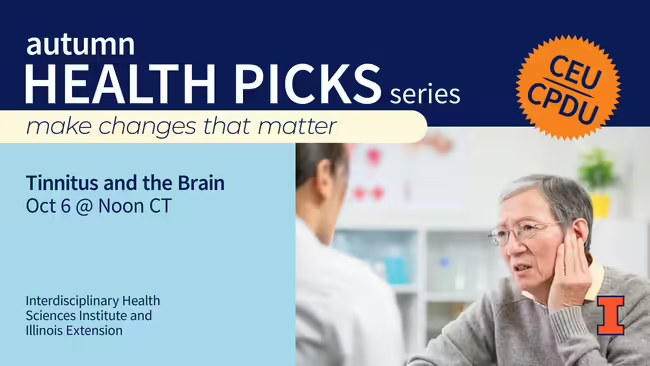
Tinnitus and the Brain
October 6 | Noon CST
Have you ever left a concert or other loud event with some ringing in your ears? It is estimated that nearly 50 million Americans live with persistent ear ringing - better known as tinnitus. While there are some ways to reduce tinnitus-related distress, there is no cure. Presenter Rafay Khan discusses what we know about tinnitus, what we would like to, the difficulties in studying it, and how we can help those who suffer from it.
If an accommodation is needed to participate in the program, please email Chelsey Byers at clbyers@illinois.edu. Early requests are strongly encouraged to allow sufficient time to meet access needs.
About the Webinar Series: Autumn Health Picks
As the upcoming fall weather approaches, it’s important to gain an understanding of common health diagnoses and practices. In University of Illinois Extension's autumn webinar series, dive deeper into specific health conditions such as tinnitus and traumatic brain injuries. Learn how brain waves function, what genetic screening is, how to protect your health data, and more. This series is free and offered online.
Other Webinars in the Series
Sugar and Fat: Friend or Foe?
October 13 | Noon CST
How often do you hear about someone promoting a low-sugar or low-fat diet that claims to cure all of your health problems? Too often. The truth is, not all sugars and fats are created equal. To achieve optimal health, we need the right kinds of both. Join presenter Ru Liu, to learn about the different kinds of sugars and fats, and how low-sugar and low-fat diets affect our bodies.
TBI Prevention and Recovery: What Everyone Should Know
October 20 | Noon CST
Each year, an estimated 1.5 million Americans suffer a traumatic brain injury (TBI). Fortunately, many TBIs are predictable and preventable. Join Evan Anderson, to learn about common causes of this neurological disease, the steps you and your loved ones can take to reduce your risk of suffering a TBI, and the remarkable ways the brain compensates and adapts following a traumatic brain injury.
Domestic and Intimate Partner Violence in Research and the Law
October 27 | Noon CST
How much do we know about domestic or intimate partner violence? These types of violence are a public health issue and have individual and societal costs. According to recent data from the CDC, approximately 1 in 4 women and nearly 1 in 10 men experience sexual, physical, and/or stalking by an intimate partner during their lifetime. Join So Young Park to learn how to legally and theoretically identify and understand different types of violence, and what research tells us about its impact on families.
Brain Waves: What Can They Tell Us?
November 3 | Noon CST
Many of you have probably heard about "brain waves," but what are they and where do they come from? More importantly, how can we measure them and what can they tell us about the brain? Join Grace Clements as she discusses the history, methodology, and some current research on these so-called "brain waves."
Understanding Genetic Screens
November 10 | Noon CST
Genetic screening is one of the most powerful tools used in biological sciences, allowing researchers to learn more about genetic interactions and risk factors. Outside of the lab, genetic screening has transformed the way some diseases, including certain cancers, are treated. Join presenter Sneha Das as she discusses how genetic screening works, unpacks some of the latest research, and highlights how this tool is helping researchers and clinicians better understand and treat diseases.
Health Data: What Does HIPAA Protect?
November 17 | Noon CST
Lately, the acronym HIPAA is showing up everywhere! Are you familiar with the term? Do you know what it truly means to have protected health data, and have you taken measures to ensure that yours is safe? Join Erica Noel as she talks about the history of HIPAA and keeping your health information from falling into the wrong hands in a post-COVID world.